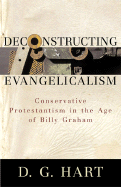
D. G. Hart
Reviewed by: Charles R. Biggs
Deconstructing Evangelicalism: Conservative Protestantism in the Age of Billy Graham, by D. G. Hart. Published by Baker Academic, 2004. Hardback, 224 pages, list price $21.99. Reviewed by OP pastor Charles R. Biggs.
What are evangelicals? What do they believe?
D. G. Hart, an elder in the OPC and a historian, has written another fine historical study that ought to be considered by pastors and laypeople alike. His new book is a work of deconstruction: not linguistic or literary deconstruction, but the deconstruction of an identity. He writes provocatively in his introduction:
Evangelicalism needs to be relinquished as a religious identity because it does not exist. In fact, it is the wax nose of twentieth-century American Protestantism. . . . Despite the vast amounts of energy and resources expended on the topic, and notwithstanding the ever growing volume of literature on the movement, evangelicalism is little more than a construction. (pp.16-17)
Hart in no way undermines the good that God has done through the work of twentieth-century evangelicals. What he seeks to understand is how we should categorize people who are held together by "parachurch celebrities" and a few basic doctrines.
Hart argues that in the twentieth century evangelicalism has envisioned the church as more of a business, with individual believers as consumers. If they do not like the product, whether it be a radio sermon or a television broadcast, they can merely turn it off. In contrast to evangelicalism, those who have identities in the visible church, through local church membership, are confessional and have submitted to elders. Hart writes:
Churches, unlike parachurch entities, have creeds that let people contemplating membership know the content of the denomination's faith. Churches also have structures of governance that provide a mechanism of accountability that is very different from that of the market model, which determines which parachurch celebrities are the most popular and therefore authoritative. (p. 124)
Hart concludes: "Evangelicalism is a seemingly large and influential religious body, but it lacks an institutional center, intellectual coherence, and devotional direction" (p. 176). What then is the "recipe" for evangelicalism? "Combine two cups of inerrancy, one cup of conversion, and a pinch of doctrinal affirmations; form into a patchwork of parachurch agencies, religious celebrities, and churches; season with peppy music professionally performed; and bake every generation" (p. 183).
Anyone concerned with the rampant individualism in today's congregations, as well as the lack of commitment to congregational life and membership, should read this book and consider it thoughtful. Evangelicals have been used by God for many good things, one being the upholding of the biblical doctrine of the inerrancy of Scripture. Yet the same inerrant Scripture that evangelicalism defends teaches the importance of being part of a visible church and congregation of Christ's people. What good is affirming an inerrant Scripture. if we do not obey it and allow it to create our identity as the people of God?
I am convinced by the book's conclusions; I encourage you to read it as well!
December 14, 2025
December 07, 2025
November 30, 2025
November 23, 2025
November 16, 2025
November 09, 2025
November 02, 2025
© 2025 The Orthodox Presbyterian Church